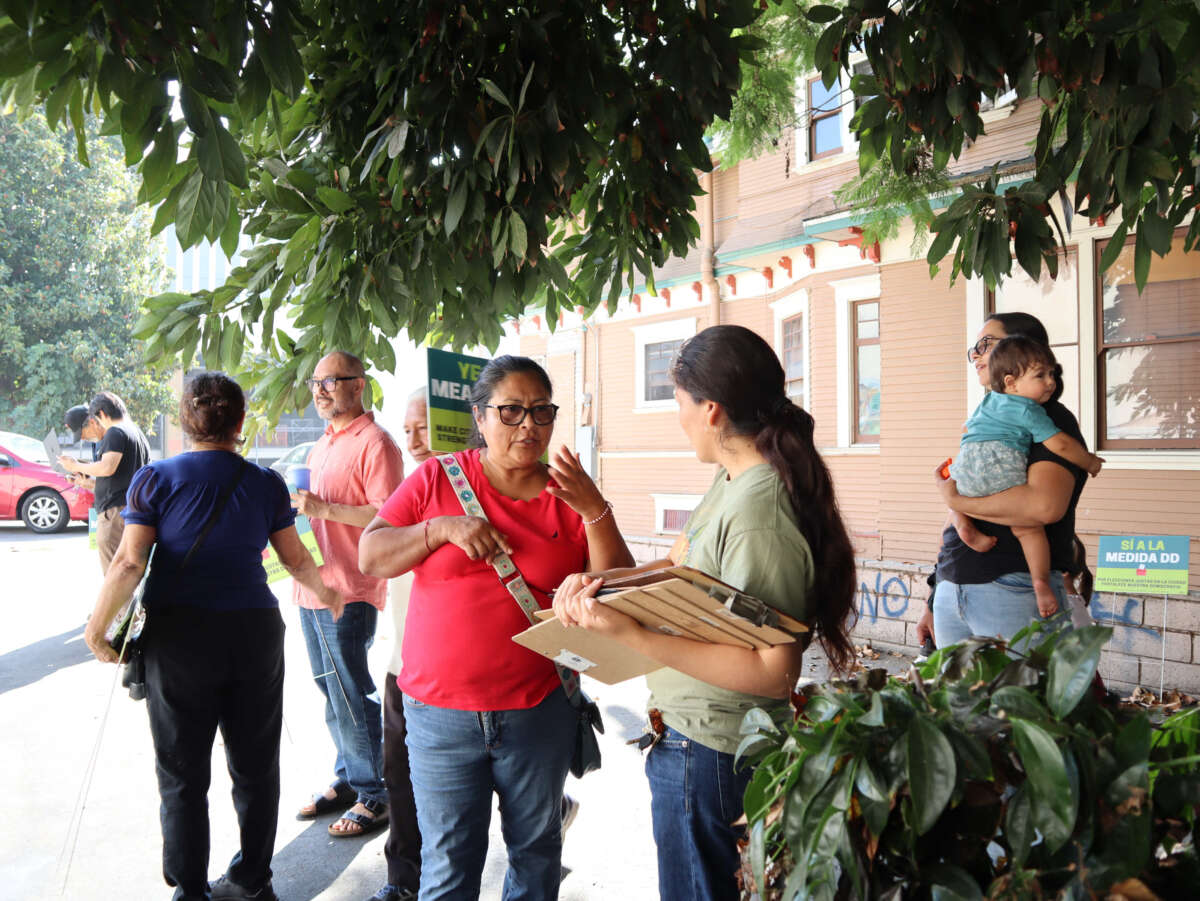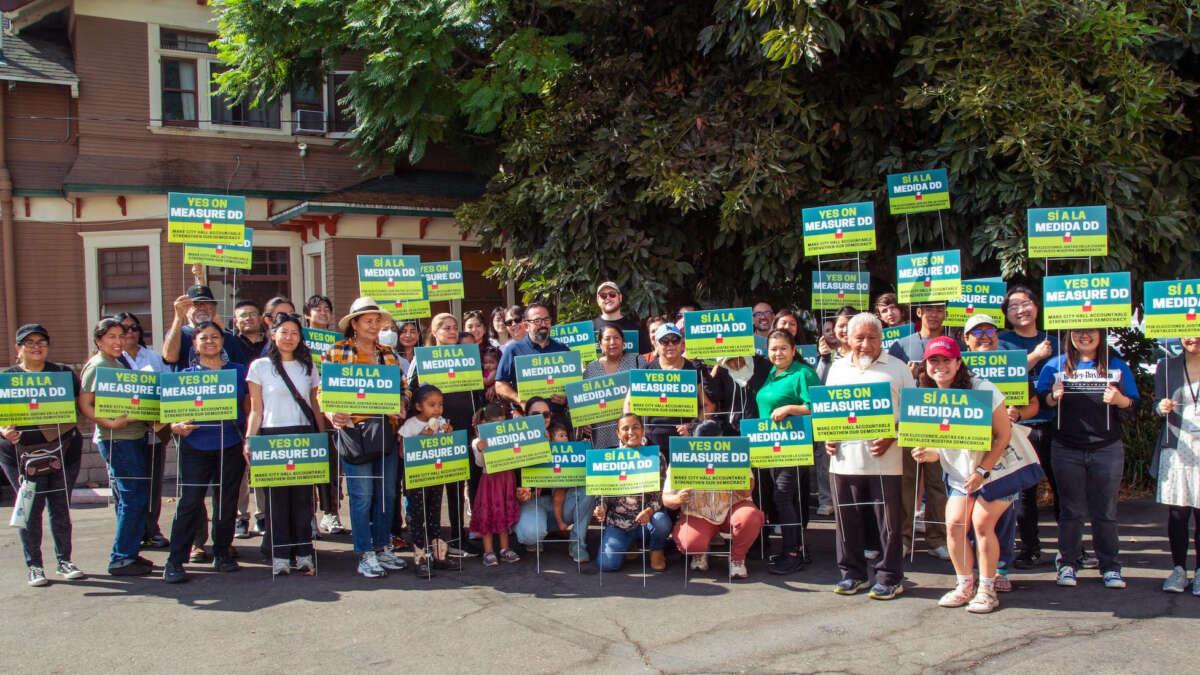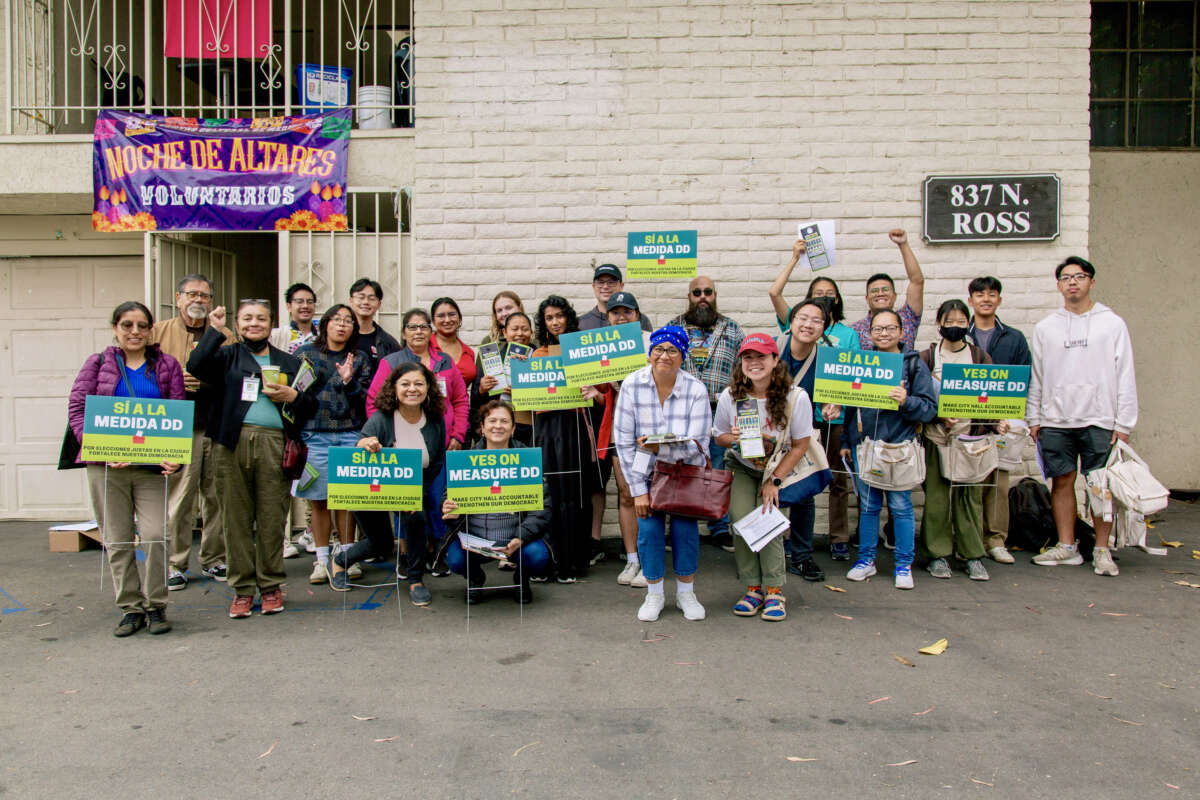Part of the Series
Voting Wrongs
Honest, paywall-free news is rare. Please support our boldly independent journalism with a donation of any size.
When he was in second grade, Alexis Jaimes asked his undocumented parents who they would be voting for in the upcoming elections.
“They said they couldn’t, and I found that so strange,” Jaimes, now a 30-year-old teacher, told Truthout. “Why can’t they, but others could?”
On election day, Santa Ana, a city in the greater Los Angeles region, will be voting on whether its 24 percent residents who aren’t citizens can vote in local elections. Jaimes canvassed for the first time. He felt nervous but hoped his drive would make up for his inexperience.
If the measure passes, Santa Ana will join 19 jurisdictions across Maryland, Vermont, California, Illinois and Washington, D.C. to give noncitizens the right to vote in local elections such as city council or school board races. To convince voters, a coalition led by Asian and Latino residents have been arguing that “parents and taxpayers” should have voting rights.
History of Noncitizen Voting in the U.S.
According to San Francisco State University professor Ron Hayduk, between 1776 and 1926, immigrants in 40 states voted in local, state or national elections at some point in time. Sometimes, those rights were given to white immigrants to undermine other marginalized groups, Hayduk said. New territories would pull white settlers in through voting rights while ignoring Native American sovereignty or to delay Black civil rights.
Arkansas was the last state to eliminate noncitizen voting in 1926, around the same time state governments rolled out poll taxes, literacy tests, felony disenfranchisement laws and restrictive registration procedures.
Hayduk argued in a 2023 report that today’s noncitizen voting movement is not part of a settler project but an effort to recognize immigrants as legitimate stakeholders.
In 1992, the City of Takoma Park, Maryland, was the first to restore noncitizen voting in local elections. In 2016, after two failed attempts, San Francisco passed an initiative allowing noncitizen parents to vote in school board elections. Today, 19 jurisdictions allow noncitizens to vote in elections at the local level, and another dozen have considered similar laws.
The momentum to stop noncitizens from voting is also growing. Seven states have laws banning local voting; eight states have similar measures on the ballot this November. On October 30, the Supreme Court allowed Virginia to purge 1,600 alleged noncitizens from voting records, ensnaring an undetermined amount of citizens in the process.
Some places only allow lawful permanent residents to vote; others extend the right to all residents, regardless of their status. In some cases, the voting rights are for all local elections; for others, they are restricted to the school board.
Between 1776 and 1926, immigrants in 40 states voted in local, state or national elections at some point in time.
This movement for voting rights has been facing pushback. Hayduk told Truthout that all jurisdictions — minus the towns in Maryland — that allowed noncitizen voting have been sued.
In 2022, a judge ruled New York City’s noncitizen vote unconstitutional. That same year, conservative James Lacy sued San Francisco to end voting rights for noncitizens. A San Francisco Superior Court judge ruled noncitizen voting illegal, but the First District Court of Appeals sided with the city in August 2023. The Santa Ana campaign started in the fall.
Parents and Taxpayers as Stakeholders
Hayduk said that the coalition behind the San Francisco campaign, just like the one in Santa Ana, was broad, making it easier to coordinate activities and influence elected officials.
In San Francisco, the noncitizen voting campaign started in the early 2000s. The initiative failed twice, but by narrow margins. Managing Director of Programs at Chinese for Affirmative Action Annette Wong said Donald Trump’s presidential run spurred the measure’s passage in the 2016 elections.
“A lot of folks in San Francisco wanted to say no to Trump and vote for anything that was anti-Trump,” Wong told Truthout. “Some of what carried us that year was just this political window that opened.”

In spring of 2023, the Immigrant Parent Voting Collaborative and Chinese for Affirmative Action organized a meeting between 75 immigrant voting stakeholders to increase collaboration between organizations. Tracy La, the executive director of an Orange County organization called VietRISE, is a core Santa Ana campaign committee member. La founded VietRISE in 2018 in a response to the Trump’s administration lawsuit against California’s sanctuary laws.
“Latinos aren’t the only ones facing these issues,” La told Truthout. “Vietnamese have immense political power.”
Orange County, California, has the largest Vietnamese community outside of Vietnam. La said there’s an assumption that the Vietnamese community is fiscally conservative. But while organizing, she found seniors had been organizing for rent control since 2017.
Local organizations worked together to pass a rent control ordinance in 2021. After it passed, a group of 11 people involved in the campaign met to decide on their next focus. They settled on noncitizen voting, and were able to get a measure on the ballot on their first try.
“Campaigns that are formed like this take years,” La said. “But we had a really strong coalition and we had allies at the city council that voted to get this onto the ballot.”
The coalition faced a lawsuit alleging that the ballot initiative was partisan for using language such as “including those who are taxpayers and parents.”
La said the suit fueled the campaign. “That actually ended up revitalizing our organization and our campaign groups,” she said. “Because we attended two different hearings and showed up every time with 30, 40 people.”
Despite the suit, VietRISE is focusing on canvassing. More than 50 volunteers of all ages showed up to the first canvassing event, most of whom were noncitizens. Together they spoke to 2,000 households about the ballot measure, making the case for noncitizen voting.
La said that VietRISE canvasses door to door, focusing on the neighborhood of Little Saigon and targeting younger voters.

Taxation Without Representation
A common misconception is that such a measure would be illegal, but campaigners for the measure are arguing their case. “We hear a lot of, ‘Is this even legal? I thought this was illegal!’ So we tell them and it actually is constitutional in the U.S. Constitution and then in the California state constitution,” La said.
Opponents have raised over $1 million dollars to oppose the measure; supporters have only raised $10,000.
According to La, the San Francisco measure being upheld on appeal has been effective at changing the minds of local voters.
Another common argument that canvassers hear is that it is “unfair” to citizens to let noncitizens vote. “We tell them the right to vote is only one privilege,” La told Truthout. “We remind people that immigrants are parents and people who raise families, but they don’t have a say in the future of their children’s life.”
La said opponents to the measure have claimed it will cost $10 million to implement.
Mayor Valerie Amezcua is against the measure, fearing litigation and a costly new voting system, LAist reported.
Opponents have raised over $1 million to oppose the measure; supporters have only raised $10,000.
Numbers matter on both sides of the debate. La and other advocates tell the residents they meet canvassing that noncitizens in Santa Ana pay $117 million in taxes each year.
“When people hear about how much taxes people pay,” La said, “that’s when you can see them absorb the information. That’s when they change their minds.”
Even residents who don’t have a work permit file taxes through Individual Taxpayer Identification Numbers, a 1996 program created by the IRS to collect taxes from all.
It’s no accident that this argument reflects one of the historic slogans that fueled the American Revolution: No Taxation Without Representation.

“One Way to Extend Belonging”
As with all initiatives, the devil is in the implementation.
In San Francisco, as of 2023 there were roughly 44,000 eligible noncitizen voters. In the first year that noncitizens were invited to vote in local races, however, only 59 noncitizen residents voted. The subsequent 2019 and 2020 elections saw lower participation levels (two and 31 votes, respectively). The 2022 February recall election included 235 noncitizen votes, but numbers went down below 40 votes during the regular election.
Advocates say there are several reasons for this. Hayduk said local elections suffer from a lack of awareness. It’s worse with school board elections.
The national timing of having Trump on the ballot in 2016 might have helped pass the initiative, but it made implementation all the more complicated.
“With Trump threatening to send ICE to San Francisco, the whole fear factor was really visceral and it deterred people,” Hayduk said.
Hayduk said that national shifts have affected places with well-established noncitizen voting, like in Maryland. Participation was high in the 1990s, but post-9/11 immigrant surveillance practices and political fearmongering about immigrants reduced it.
A Trump victory would make it very difficult for Santa Ana to implement noncitizen voting in a robust way.
Public voter registration raises concerns with immigration attorneys for both undocumented and permanent residents, as voting records include the individual’s address and sometimes a phone number and email. Hayduk says this could make it easier for ICE to locate someone. Some on social media wrote they will vote against the initiative to protect noncitizens.
Another fear is how voting may affect those with paths to citizenship. Naturalization forms ask whether the applicant voted in an election. The adjudicator processing the application of a Santa Ana resident might not know of the local laws, and delay or deny their request.
Wong hasn’t heard of cases being denied, but they have gone to secondary review. Since April 2024, the naturalization application now includes an exception for voting in local elections.
The risks are worth it for some. Wong knows a stateless woman, someone who will never be the citizen of any country. The San Francisco school board initiative allowed her to vote for the first time. “It’s one way to extend belonging,” Wong said.
Regardless of turnout or registration numbers, Wong emphasized that the law catalyzed a greater involvement in school board politics. Over 100 participants showed up at a recent nonpartisan candidate forum.
“Most of those parents are not going to register to vote, but they came, they engaged with the candidates,” Wong said. “Candidates know that they are beholden to that base, whether or not those people register to vote.”
A terrifying moment. We appeal for your support.
In the last weeks, we have witnessed an authoritarian assault on communities in Minnesota and across the nation.
The need for truthful, grassroots reporting is urgent at this cataclysmic historical moment. Yet, Trump-aligned billionaires and other allies have taken over many legacy media outlets — the culmination of a decades-long campaign to place control of the narrative into the hands of the political right.
We refuse to let Trump’s blatant propaganda machine go unchecked. Untethered to corporate ownership or advertisers, Truthout remains fearless in our reporting and our determination to use journalism as a tool for justice.
But we need your help just to fund our basic expenses. Over 80 percent of Truthout’s funding comes from small individual donations from our community of readers, and over a third of our total budget is supported by recurring monthly donors.
Truthout has launched a fundraiser to add 500 new monthly donors in the next 10 days. Whether you can make a small monthly donation or a larger one-time gift, Truthout only works with your support.
